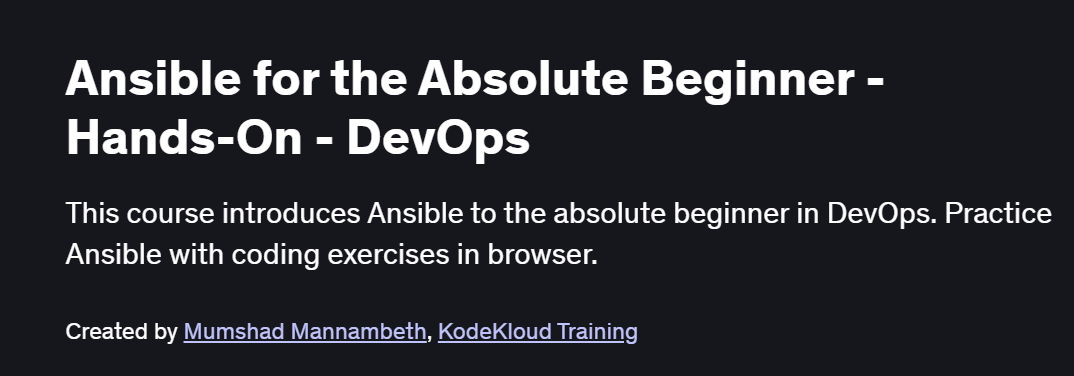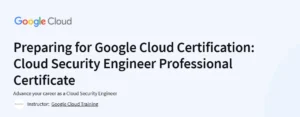What will you in Ansible for the Absolute Beginner – Hands-On – DevOps Course
Understand the core concepts and architecture of Ansible
Learn how to automate IT infrastructure using Ansible playbooks and modules
Gain hands-on experience with cloud, security, and network automation
Manage Linux and Windows environments using Ansible
Build a strong foundation for DevOps roles and infrastructure-as-code practices
Program Overview
Introduction to Ansible
⏳ 30 minutes
What is Ansible and how it fits into DevOps workflows
Overview of Ansible architecture, YAML syntax, and inventory files
Setting Up Ansible Environment
⏳ 30 minutes
Installing Ansible and configuring hosts
Understanding static vs. dynamic inventory
Working with Playbooks and Modules
⏳ 1 hour
Writing Ansible playbooks with tasks, handlers, variables, and conditionals
Using core modules for configuration management and automation
Automating Infrastructure
⏳ 1 hour
Managing files, packages, users, and services across multiple systems
Applying roles and templates for structured automation
Ansible for Cloud and Network Automation
⏳ 45 minutes
Automating AWS, Azure, and GCP tasks with Ansible
Automating networking gear like Cisco using Ansible modules
Security Automation and Best Practices
⏳ 45 minutes
Managing SSH keys, firewall rules, and compliance tasks
Ansible Vault for secrets management and secure automation
Final Review and Real-World Use Cases
⏳ 30 minutes
Practice scenarios and recap of major concepts
Real-world examples in cloud, DevOps, and IT operations
Get certificate
Job Outlook
Ansible is a top skill in DevOps, system administration, and cloud automation
Roles like DevOps Engineer, Automation Engineer, and Infrastructure Engineer frequently list Ansible as a must-have
Strong salary prospects and growing demand in enterprise IT, cloud, and cybersecurity sectors
Valuable for freelance DevOps consultants and infrastructure automation projects
Explore More Learning Paths
Boost your DevOps skills and gain hands-on experience with these related courses and resources. These learning paths will help you master automation, configuration management, and DevOps best practices.
Related Courses
DevOps Engineer
Learn end-to-end DevOps processes, including CI/CD pipelines, automation, and deployment strategies.DevOps Certification Training with Gen AI
Prepare for DevOps certification while leveraging AI tools for automation and workflow optimization.Configuration Management Using Ansible
Gain in-depth knowledge of Ansible for managing system configurations, automation, and orchestration tasks.
Related Reading
What Is Time Management
Understand how effective time and task management can optimize DevOps workflows and project execution.
Specification: Ansible for the Absolute Beginner – Hands-On – DevOps Course
|
FAQs
- No prior DevOps knowledge is required; designed for beginners.
- Basic Linux familiarity is helpful but not mandatory.
- Introduces Ansible concepts from scratch.
- Covers both theory and practical automation tasks.
- Prepares learners for further DevOps and automation courses.
- Teaches practical playbooks for managing Linux, Windows, cloud, and network systems.
- Includes tasks like package management, file handling, and user administration.
- Covers cloud automation on AWS, Azure, and GCP.
- Introduces security automation using Ansible Vault.
- Encourages applying skills to actual DevOps projects.
- Provides foundational skills for DevOps and infrastructure-as-code roles.
- Covers essential tools and modules widely used in enterprise automation.
- Prepares learners for roles like DevOps Engineer or Automation Engineer.
- Strengthens understanding of cloud, networking, and security automation.
- Serves as a stepping stone to advanced Ansible or DevOps certifications.
- Includes practical exercises with playbooks and modules.
- Demonstrates real-world automation tasks step-by-step.
- No interactive lab environment provided; independent practice is encouraged.
- Covers cloud, network, and security automation tasks.
- Reinforces concepts with examples and scenarios from IT operations.
- Total course duration is around 4–5 hours.
- Self-paced learning allows flexibility with lifetime access.
- Modules vary from 30 minutes to 1 hour each.
- Ideal for working professionals or students with limited time.
- Time investment is sufficient to grasp key Ansible concepts and tasks.





